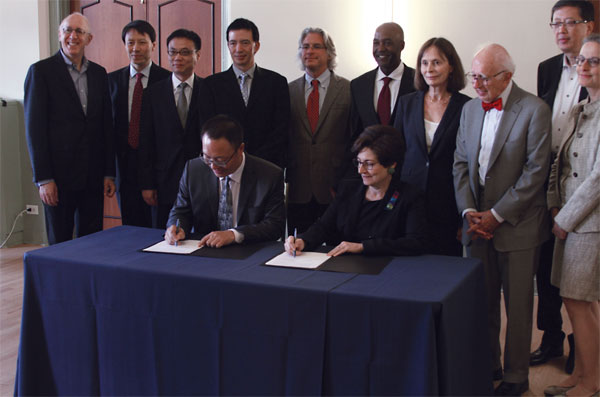Columbia University, Chinese gamer join study
|
Linda Fried (seated right), dean of Columbia University's Mailman School of Public Health, signs a memorandum of understanding with Robert Xiao, CEO of gaming company Beijing Perfect World Digital Technology, on Tuesday in New York. The two groups will study the neurological effects of gaming on China's ageing population. Amy He / China Daily |
Columbia University's School of Public Health and online gaming company Beijing Perfect World Digital Technology Co will be working with each other to study the neurological effects of gaming on the aging population.
Linda Fried, dean of Columbia University's Mailman School of Public Health, and Robert Xiao, CEO of Perfect World, signed a memorandum of understanding (MOU) at Columbia University in New York on Tuesday.
According to the MOU, the two groups will be collaborating in projects that address how digital interactive art affects the brain and its potential positive benefits to public health, with Beijing-based Perfect World working with scientists from Columbia University to develop games that may be played by test subjects in China, and eventually elsewhere, according to Deliang Tang, associate professor of environmental health sciences at Columbia University Medical Center who was key in facilitating the collaboration.
Though the school and the company hope that their studies can eventually influence policy on aging populations, Tang said that all age groups will be studied.
"If you have teenagers at home, you will know, gaming is quite an important part of their lives - video games, computer games. It's undeniable to say that digital gaming is now part of our lives. Digital gaming is a very significant public health issue - whether it's good, whether it's bad, we have to study it," he told China Daily.
"We're trying to assess the impact of gaming on society. What is the mechanism of the games and its impact in our health? How can we understand what the game has to do with our health, to do with our brain development or neurodegeneration?" he said.
There will be several parts to the study, the first of which will be to work up a prototype game and then come up with a scientific hypothesis on how the game will affect its players.
A second important part will include a population study of various age groups in China, where the study will first be conducted, though specific cities where the population study will be done have not been determined yet, Tang said.
Some work will be done at Columbia University because the school has facilities that are not available in China, but the preliminary population studies will be done in China.
At a press event where the MOU was signed, Fried, the dean of the public health school, told China Daily that the "ability to think about how to bring science and art together to do good for the population is very exciting".
She said that with China's population aging as fast as it is, she is optimistic that Columbia University and Perfect World will be able to bring the two fields together to develop solutions to help China's population and beyond.
"China's population is aging very, very fast," she said.
"Adjusting rapidly and developing approaches quickly that help people stay healthy and live longer lives are very important. It's important in the US and it's of critical concern in China," she said.
"I think we can be very optimistic that we can find ways by harnessing the power of science and the power of art together to develop ways that people will enjoy and that will keep them healthy and improve their wellbeing is very important for all countries," she added.
Xiao said in opening remarks that he was honored to be working together with Columbia at a "very exciting time, contributing to what we believe is beneficial for the future of everybody".
amyhe@chinadailyusa.com



















